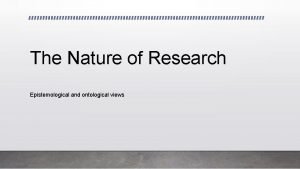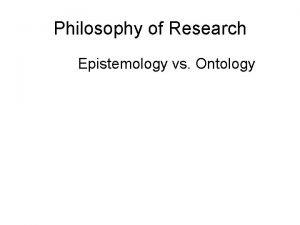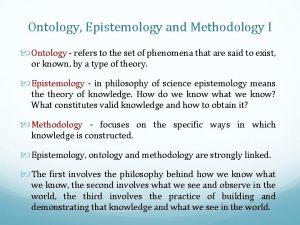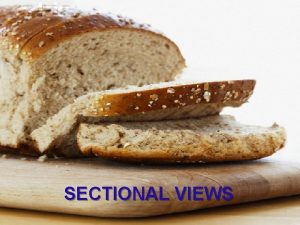ONTOLOGICAL EPISTEMOLOGICAL VIEWS Revisited KEY POINTS Your ontological














- Slides: 14

ONTOLOGICAL & EPISTEMOLOGICAL VIEWS Revisited

KEY POINTS • Your ontological views • How you believe things work • Your thoughts on the internal and external forces that affect the outcome • Ontological views of different things can be different Ontological Views info rm • Your epistemological views • Are based on your ontological views • How you believe things work will determine what you think we can know about it. • It will also determine how you think we can gain more knowledge about something. • Epistemological views of different things can be different Epistemologic al Views

ONTOLOGICAL VIEWS Things are controlled by universal laws outside of human control. Things are controlled by both external and internal factors and can change If you think that things act in accordance with universally constant rules i. e physics (gravity), chemistry (if you mix A with B you get C). If you think abklifjnclkieuygkasbliupo may lead to C but can change If you think A + B = C (objectivism) = more quantitative VS If you think C is the result of multiple, changeable internal and external factors. (constructivism or complexivism)

EPISTEMOLOGICAL VIEWS If I think A + B = C paying attention in class + studying hard = learning If we think specific universal components result in learning then we can figure out the exact recipe for learning! positivism = there is truth/ laws to find If I think abklifjnclkieuygkasbliupo may lead to C but can change based on internal and external factors Learning is a combination of internal and external variables i. e. the learning environment, the teacher, the student’s motivation, the student’s personality, study habits, parental support etc. Different combinations work for different people. interpretivism = things can change. we can know probabilities but not facts, things differ for different people so we can have only subjective knowledge

YOU HAVE BOTH • You have both ontological and epistemological views. They are different! • Ontological views • What influences the way things behave? (Universal laws external to human influence) • What influences the result? external factors) ( A combination of variable internal and • Epistemological view • Based on what influences their behavior what can we know about them? (facts, probabilities, subjective knowledge) • How can we study them ( test, observe, measure, ask, reason)

HOW DOES A PERSON LEARN LANGUAGE? • Is there a recipe for learning language? Do you think that A+B+C+D+E with 100% result in a person learning a language? • Does it depend on many factors internal and external to the person learning? Does it differ from person to person? Does each person require their own individual recipe?

WHAT MAKES A GOOD TEACHER? • If a teacher follows a certain recipe does that mean they will be a good teacher? Does it mean that their students will learn? • Does it depend on many factors? Does each teacher differ?

IMPORTANT TO CONSIDER • What is taught in a classroom is not always learned. • What is learned in classroom is not always taught. • People work in different ways and have different things that work for them.


COMBINING QUALITATIVE & QUANTITATIVE METHODS • Advantages of each complement the other, resulting in a stronger research design, and more valid and reliable findings. • Inadequacies of individual methods are minimized • The what can also be supported with the why • Offers a balance between logic and stories What are the qualities of a good teacher? Place a check by all the qualities you agree with. q Humor q. Teaching style q. Passion q. Knowledgeable q. Good looking q. Other____

? QUALITATIVE BEFORE QUANTITATIVE# • Qualitative techniques can be used to provide much needed information when exploring new areas • Can give you a general idea of the topic you are exploring and the issues that exist • Can be used to gather information that can be used to create a survey or other follow up data collection procedures. • Use of qualitative method to check assumptions & refine research questions is valuable across & within culture

# QUANTITATIVE BEFORE QUALITATIVE ? • Quantitative studies can numerical data that lacks explanation • Qualitative studies help to provide clarity to such data • By doing quantitative first you can collect the what, then go back and get the why. What are the qualities of a good teacher? Place a check by all the qualities you agree with. q Humor q. Teaching style q. Passion q. Knowledgeable q. Good looking q. Other____

CHECK UP • What are your ontological views of human behavior? • What are your ontological views of how the sun behaves?

CHECK UP • What can we know about human behavior based on your ontological views? • Facts • Probabilities • Subjective knowledge • How can we know about human behavior better? • Observing • Testing • Asking • Rationalizing • Measuring
 Epistemology vs ontology
Epistemology vs ontology Constructivism ontology
Constructivism ontology Ontology epistemology methodology
Ontology epistemology methodology Straight line motion revisited homework
Straight line motion revisited homework Random sampling over joins revisited
Random sampling over joins revisited Write up for school magazine
Write up for school magazine Bull's eye brand positioning
Bull's eye brand positioning Point of difference and point of parity
Point of difference and point of parity Lesson 81 drop in molecular views
Lesson 81 drop in molecular views In the help strategy, the h stands for healthful
In the help strategy, the h stands for healthful Ontological philosophy
Ontological philosophy Ontological argument
Ontological argument Ontological security
Ontological security Quine ontological commitment
Quine ontological commitment Teleological vs ontological
Teleological vs ontological
























